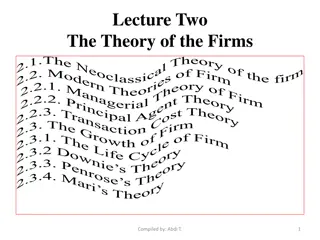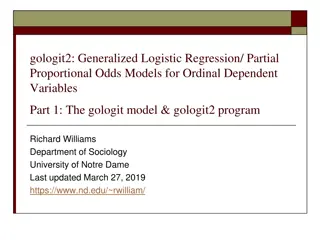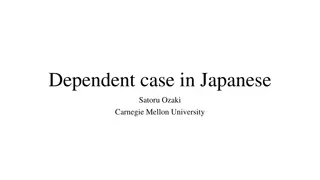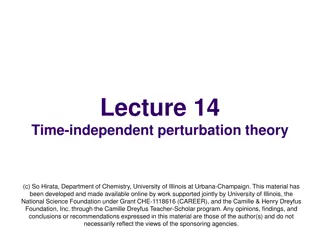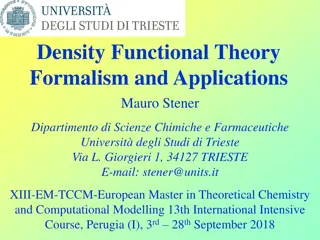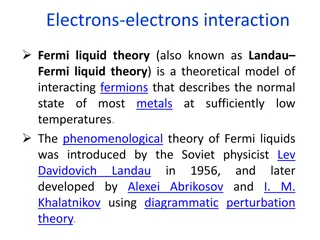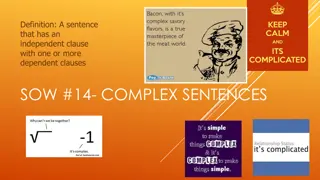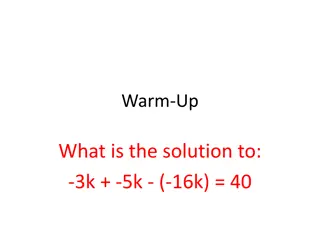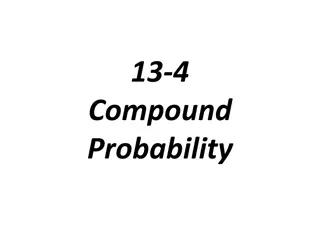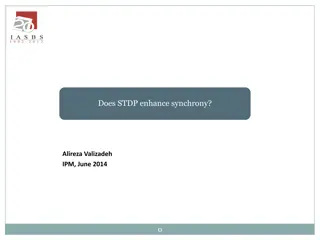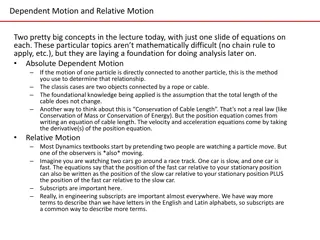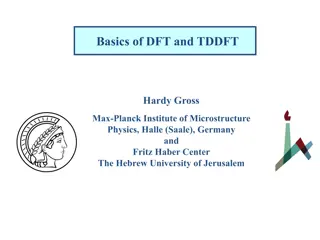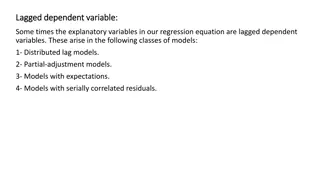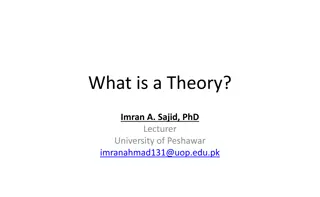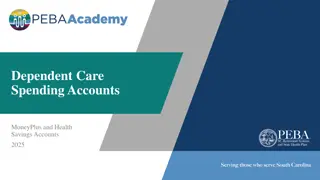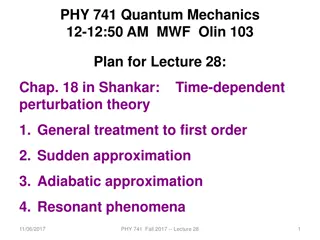Coverage Semantics for Dependent Pattern Matching
Delve into the world of dependent pattern matching with a focus on coverage semantics. Dive deep into the concepts of denotational semantics, topologies, and coverages. Explore the interplay between patterns, values, and types in a novel way, shedding light on the essence of pattern matching.
4 views • 26 slides
Evolution of Mathematical Theories and Proof Systems
Development of mathematical theories such as model theory, proof theory, set theory, recursion theory, and computational complexity is discussed, starting from historical perspectives with Dedekind and Peano to Godel's theorems, recursion theory's golden age in the 1930s, and advancements in proof t
3 views • 29 slides
Independent and Dependent Clauses
An independent clause contains a subject and a verb, forming a complete sentence on its own, while a dependent clause also has a subject and a verb but cannot stand alone. Dependent clauses rely on independent clauses to form complete sentences and are introduced by subordinating conjunctions. When
3 views • 4 slides
Psychological Theories of Criminality: Understanding the Roots
Psychological theories of criminality delve into the association between intelligence, personality, learning, and criminal behavior. Major theories include Psychodynamic Theory by Freud, Behavioral Theory by Bandura, and Cognitive Theory by Kohlberg. These theories explore how unconscious mental pro
1 views • 20 slides
Theory of Firms: Neoclassical vs. Modern Approaches
The theory of firms is explored through the Neoclassical and Modern perspectives. Neoclassical theory focuses on profit maximization, while Modern theory delves into managerial, principal-agent, and transaction cost theories. The discussion covers criticisms of Neoclassical theory and the essential
2 views • 79 slides
Theories of Causation in Psychological and Social Sciences
Overview of theories of causation categorized into psychological, social psychological, and sociological perspectives. Psychological theories focus on instinctive, biological, and psychological qualities of abusers, including Attachment Theory, Psychodynamic Theory, Social Learning Theory, and Situa
1 views • 15 slides
Political Theory through a Contextual Approach
Exploring G.H. Sabine's perspective on political theory through a contextual approach, emphasizing the importance of historical context and societal influences. Sabine argues that while political theory evolves with its contemporary politics, it should be analyzed within its specific time and social
0 views • 9 slides
Overview of gologit2: Generalized Logistic Regression Models for Ordinal Dependent Variables
gologit2 is an advanced program for estimating generalized logistic regression models, including proportional odds, generalized ordered logit, and partial proportional odds models. It offers features beyond traditional ologit, allowing for less restrictive and more parsimonious modeling of ordinal d
1 views • 27 slides
Dependent Branches in Business Operations
In any business undertaking, as the business expands, it often establishes branches to market products over a wider territory. Dependent branches rely on the head office for supply of goods and cash, and do not maintain separate accounts. This article explores the types of branches, features of depe
2 views • 5 slides
Evolution of Light Theory: From Wave Theory to Quantum Theory
At the turn of the century, the discovery of the photoelectric effect challenged the wave theory of light, leading to the development of the quantum theory by Max Planck and Albert Einstein. This new theory introduced the concept of discrete energy units known as quanta, bridging the gap between wav
3 views • 62 slides
Dependent Case Theory in Japanese Linguistics
Dependent case theory challenges traditional views on case assignment, particularly in the context of Japanese grammar. This theory argues for a different approach to case assignment based on interpretative processes rather than licensing conditions. The theory is explored in-depth, discussing neces
2 views • 40 slides
Dp-branes, NS5-branes, U-duality, and M-Theory Overview
Overview of Dp-branes, NS5-branes, and U-duality derived from nonabelian (2,0) theory with Lie 3-algebra. Introduction to M-theory, including M2-branes and M5-branes in the strong coupling limit. Discussion on BLG theory, Lorentzian Lie 3-algebra, and the ABJM theory for M2-branes.
3 views • 32 slides
Time-Independent Perturbation Theory in Quantum Mechanics
Perturbation theory is a powerful tool in solving complex physical and mathematical problems approximately by adjusting solutions from a related problem with known solutions. This theory allows for more accurate approximate solutions by treating the difference as a small perturbation. An example inv
0 views • 19 slides
Density Functional Theory in Computational Chemistry
Dive into the formalism and applications of Density Functional Theory (DFT) through a comprehensive review of basic theory, equations, and numerical implementations. Explore concepts like Time-Dependent DFT (TDDFT) and Linear Response formalism, and discover its applications in studying plasmons, co
1 views • 26 slides
Ethical Theories: Divine Command vs. Virtue Theory Explained
Divine Command Theory asserts that morality is derived from God's commands, contrasting with Virtue Theory which focuses on developing moral virtues to achieve human flourishing and excellence. Divine Command Theory relies on religious texts, while Virtue Theory emphasizes the cultivation of virtues
0 views • 24 slides
Fermi Liquid Theory in Interacting Fermion Systems
Fermi liquid theory, also known as Landau-Fermi liquid theory, is a theoretical model that describes the normal state of metals at low temperatures. Introduced by Landau and further developed by Abrikosov and Khalatnikov, this theory explains the similarities and differences between interacting ferm
0 views • 23 slides
Complex Sentences in English Grammar
Complex sentences consist of an independent clause along with one or more dependent clauses. The independent clause can stand alone, while the dependent clauses rely on the independent clause for meaning. Differentiating between independent and dependent clauses is essential in understanding how com
0 views • 15 slides
Independent and Dependent Variables in Algebra
Learn about independent and dependent variables in algebraic situations, equations, tables, and graphs. Discover the role of each variable, how they are classified, and their impact on functions. Practice identifying independent and dependent variables through examples and understand their significa
1 views • 55 slides
Probability: Independent, Dependent, and Compound Events
Dive into the world of probability with a focus on independent, dependent, and compound events. Explore scenarios where events are interconnected or standalone, and learn how to calculate the probabilities of different outcomes. Discover the concepts of mutually exclusive and overlapping events thro
0 views • 9 slides
Computational Learning Theory: An Overview
Computational Learning Theory explores inductive learning algorithms that generate hypotheses from training sets, emphasizing the uncertainty of generalization. The theory introduces probabilities to measure correctness and certainty, addressing challenges in learning hidden concepts. Through exampl
2 views • 43 slides
Automata Theory and Theory of Computation Overview
This course overview covers concepts in automata theory and theory of computation, including formal language classes, grammars, recognizers, theorems in automata theory, decidability, and intractability of computational problems. The Chomsky hierarchy, interplay between computing components, modern-
1 views • 42 slides
Theories of Interest in Microeconomics II
Explore various theories of interest in economics, including the Classical Theory, Liquidity Preference Theory by Keynes, Productivity Theory, Abstinence Theory, Time-Preference Theory, Fisher's Time Preference Theory, and the Loanable Fund Theory. These theories offer different perspectives on the
3 views • 6 slides
The Evolution of Atomic Theory
Delve into the historical journey of atomic theory starting from Democritus and Aristotle's views to modern advancements proving some aspects of Dalton's theory incorrect. Learn about key laws and theories such as the Particle Theory of Matter, Dalton's Atomic Theory, and JJ Thomson's discoveries, s
2 views • 30 slides
Effects of Spike-Timing-Dependent Plasticity (STDP) on Synchrony in Neural Networks
This presentation delves into the impact of Spike-Timing-Dependent Plasticity (STDP) on synchrony within neural networks, examining how the structural effects of STDP enhance synchrony and influence network dynamics. Various forms of STDP, such as pair-based additive STDP and variations like nonline
1 views • 13 slides
Enhancing Reading Comprehension Through Text-Dependent Questions
This resource delves into the significance of text-dependent questions in improving students' reading comprehension skills by emphasizing the importance of evidence from the text, building knowledge through nonfiction, and developing critical thinking abilities. It highlights key advances in educati
1 views • 16 slides
Dependent and Relative Motion in Dynamics
Dependent Motion and Relative Motion are fundamental concepts in Dynamics, providing the foundation for future analysis. Dependent Motion involves constraints like ropes or cables, while Relative Motion considers observers in motion. Dynamics involves applying a limited set of equations in diverse w
2 views • 18 slides
Macromechanical Analysis of Lamina and Tsai-Hill Failure Theory Overview
The Tsai-Hill failure theory is based on the strengths of a unidirectional lamina, incorporating longitudinal and transverse tensile and compressive strengths, as well as in-plane shear strength. This theory, derived from the distortion energy theory, provides criteria for determining lamina failure
0 views • 15 slides
Theories of Personality: Type Theory, Trait Theory, Psychoanalytic Theory
Personality theories such as Type Theory, Trait Theory, and Psychoanalytic Theory classify personality based on various factors like body build, introversion/extroversion, enduring characteristics, and unconscious forces influencing behavior.
0 views • 13 slides
Basics of DFT and TDDFT
Delve into the fundamentals of Density Functional Theory (DFT) and Time-Dependent Density Functional Theory (TDDFT) through the works of Hardy Gross, a prominent researcher at Max-Planck Institute of Microstructure Physics. Explore the Hamiltonian of condensed matter systems, including atoms, molecu
0 views • 36 slides
Quark Sivers Function and Spin-Dependent Odderon: Insights from Small-?
Quark Sivers function and spin-dependent Odderon play crucial roles in understanding the three-dimensional structure of hadrons and the asymmetries observed in high-energy scattering processes. Ongoing efforts are focused on determining the small-? asymptotics of these functions and their contributi
0 views • 17 slides
Buddhist Concept of Dependent Arising Focus
Buddhist concept of paticcasamuppada (dependent arising), which reveals the interconnected nature of existence. Dive into the formula, significance, and implications of dependent arising as explained through key terms and the Tibetan Wheel of Life.
0 views • 4 slides
Lagged Dependent Variable Models in Regression Analysis
Lagged dependent variables are utilized in various regression models such as distributed lag models, partial-adjustment models, models with expectations, and models with serially correlated residuals. By incorporating lagged dependent variables, researchers can analyze the impact of past values on t
0 views • 11 slides
Theory: Nets to Rationalize, Explain, Master
The concept of theory is explored through the works of Imran A. Sajid, Ph.D., and definitions by various scholars. Essential elements of a theory, including concepts, facts, hypotheses, and principles, are dissected along with the role of concepts in theory-building, particularly in social work prac
0 views • 47 slides
Independent and Dependent Events
Explore the concepts of independent and dependent events through various scenarios such as flipping coins, selecting marbles, and rolling dice. Understand how the outcome of one event can influence the probability of another, and learn how to calculate the probabilities of both independent and depen
0 views • 8 slides
Data Integration with Dependent Sources: Query Answering System
An exploration of a system called IDS for integrating dependent sources in data processing. The paper addresses theoretical challenges, focusing on query answering with dependent sources. Investigates source selection, computation, coverage, configuration, cost, and more. Proposes solutions for choo
0 views • 36 slides
Bayesian Philosophy of Science and Confirmation Theory
This content delves into the Bayesian Philosophy of Science, focusing on the Bayesian Confirmation Theory (BCT). It discusses conditions of adequacy and representation theorems, showing how Bayesian Confirmation Theory can be applied by historians of science and scientists. The theory addresses para
0 views • 26 slides
Theory Construction in the Social Sciences: Understanding Components and Types
Explore the key components of theory construction in the social sciences, including the definition of theory, different types of theories, components of a theory, and the distinction between Big T and small t theories. Discover what theory is not and gain insights into the process of theory construc
0 views • 38 slides
2025 Dependent Care Spending Accounts and Health Savings Accounts Overview
Learn about the benefits and contribution limits of Dependent Care Spending Accounts (DCSA) and Health Savings Accounts (HSA) for the year 2025. Understand eligible expenses, reimbursement deadlines, and important information regarding these accounts. Discover how these accounts can help you save mo
0 views • 5 slides
Valence Bond Theory vs Molecular Orbital Theory: A Comparison
Explore the differences between Valence Bond Theory and Molecular Orbital Theory, including their postulates, strengths, and weaknesses. Valence Bond Theory, proposed by Linus Pauling, focuses on atomic orbital overlap, while Molecular Orbital Theory, introduced by Hund and Mullikan, emphasizes the
0 views • 16 slides
Understanding Time-Dependent Perturbation Theory in Quantum Mechanics
Delve into time-dependent perturbation theory in quantum mechanics through topics like general treatment to first order, sudden approximation, adiabatic approximation, and resonant phenomena. The lecture explores the treatment of time-dependent perturbations using complete basis sets and perturbatio
0 views • 12 slides




